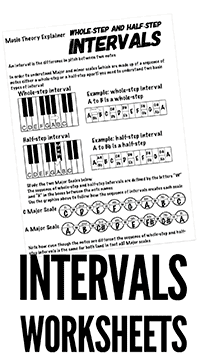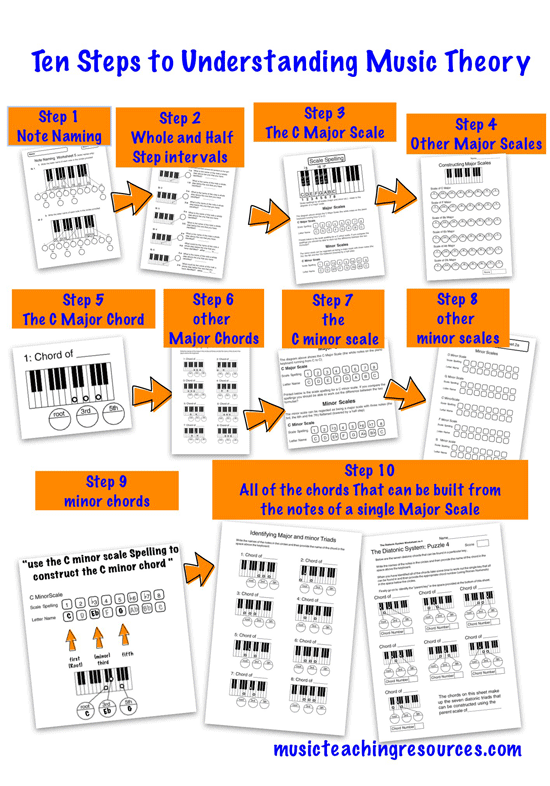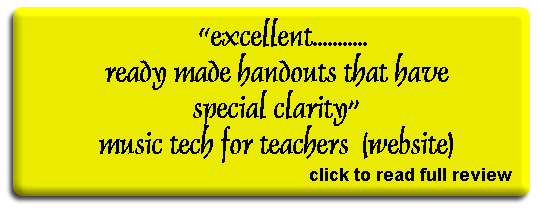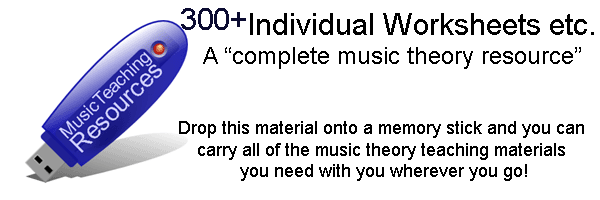
Music Worksheets KS3
Key Stage 3 seems to me to be where the study of music gets a bit interesting and theoretical. KS3 is where students are required to know how music works rather than what it is. Scales and Chords come into play in a way that maybe is not the case in KS2 and learners with significant holes in their theoretical knowledge can find that (no matter how much they love music) they struggle to get a "joined up" knowledge of how notes are ordered into scales, chords and keys.This can lead to frustration and the feeling that the study of music theory is not for them (often despite the fact that they have chosen to study music at an advanced level).
This type of student (typically those whose primary interest is in "popular" music?) can often "muddle through" lessons where theory plays a significant role and their final grade (upon we as teachers are all too often judged) can suffer as a result
Self Contained "Notation Free" Basic Music Theory Course
An entire basic music theory course in twelve packs that takes students from a position where they have no functional knowledge of music theory to a place where they "totally get" note names, scales,chords and keys

Find Out More and Download a Free Pack Now!
Download all of the materials that you see on this website for a one off payment of $18.00
$18.00

Using Music Worksheets at KS3
At key stage three music students are required to dig further into stylistic analysis and music history etc but underpinning all of this is the requirement that they develop (and are able to express) a functional understanding of scales, chords and keys. Developing confidence in this area will inevitably lead to a greater understanding of all other areas (generic and stylistic analysis etc) of the subject
There follows (an admittedly cynical) analysis of the stage...
Key Stage 3 Music can be regarded in one of two ways. Either it is the stage where more able and interested students are obliged to "tread water" working alongside less enthusiastic students before exam options are chosen and the "real work" begins or it is the stage during which a large number of learners (who even though they love and enjoy music) become convinced that further study of the subject is not for them?
One of the problems that we face as music educators at key stage 3 is that our student groups are made up of two basic models of learner. The first (sub) group consists of students who will traditionally move on to study music at a higher level following on from ks3. When they enter the stage they have practical abilities on traditional instruments. They learned to function on these instruments at a younger age and were introduced to musical notation from the get go. Because they are "primed" in this way they tend to be undaunted by the principles of music theory and have little difficulty in coping with more advanced theoretical concepts, seeing them as merely an addition to the knowledge that they already have.
The second (and largest?) sub group of students are made up of those young people who probably love music but who do not understand how it works. Many of these learners already play instruments (typically guitars and drums or they may sing?) at an intermediate (or even a technically advanced) level but they regard music theory as being a bunch of horribly complicated "rules"
Lets aim high?
How about this for a target?
By the end of Key Stage 3 all of my students will be able to do the following.....
1: Name any note on the keyboard
2: Understand whole-step and half-step intervals
3: Be able to use whole-step and half-step intervals to construct any Major (or minor) scale
4: Use Major and minor scales to construct any Major (or minor) chord
5: Be able to identify the chords contained within any key
The 400+ worksheets that you can download from this site are designed to be used in a series of lessons and aimed at taking students from where they have no functional knowledge of music theory to a place where they just "get it".
Music Theory with the "Modern" Classroom in mind
Although the download does feature worksheets that concern themselves with gaining or developing familiarity with notated music they are designed to allow students to understand how music theory works without first having to understand traditional (notated) forms.
Note Naming
Intervals
Scales
Chords
Key Signatures
Harmonic Systems.
The materials are not put together with a particular examination (or even key stage) in mind but are concerned with making sure that students understand the "nuts and bolts" of music theory

Studying Music Theory at KS3
In order for a student to properly understand how music theory works it is important that the basics are attended to.
To help your students to aquire this "joined up" knowledge base you can download more than 400 professionally prepared handouts that can be printed over and over again for less than the price of a single textbook!Download Free Music Theory Lesson Plans
Follow This Link to download a PDF containing a series of lesson plans designed to et the basics of music theory over to any student
Below you can see an infographic which describes how a teacher might use our materials to take students from a point where they have no functional "joined up" understanding of how music theory works to a situation where they feel confident working with and expressing the theoretical element to music theory
When they have applied themselves to the material dealt with in the ten steps outlined below then they will be ready to study more advanced concepts such as seventh chords, blues and pentatonic scales (our "one click download" has worksheets on these areas too as well as the material dealing with the "basics")
Printable Music Theory Worksheets
The material has been devised so as to introduce principles and then test and reinforce understanding of those principles. The music worksheets and handouts provide a simple, flexible and powerful resource to music educators and help with the development of a functional and workable understanding of the principles that govern music theory.
The worksheets are not specific to a particular style of music or exam syllabus (as the reality is that Bach used the same twelve notes as Charlie Parker?)
Once they have been downloaded you can print these invaluable music education resources straight from the hard drive of your computer or drop the files onto a phone or memory stick and take them into your school or college for photocopying etc. Whatever suits the way you work? Any way you choose you can be sure that for the rest of your teaching career you will always have access to first class music worksheets.
Enjoy!
DOWNLOAD 400+ KS3 level Music Theory Worksheets NOW!
A lifetime of re-usable resources for only $18.00
How to access your simple "one click" download
$18.00
You can buy your music theory worksheets in complete safety via any major credit card (through paypal) or directly through your paypal account if you have one. If you choose to use a credit card, rest assured that we never see your credit card details as paypal do all of that for us.
When Paypal receive your payment you will be immediately invited to click a
"RETURN TO MERCHANT"button.
You will be taken to a page from where you can download all of the music theory worksheets that you have paid for NOW!
In the (rare) event that something should go wrong with the order/download process just email me at robh@teachwombat.com
I will check the order and send you the links that will get you to your stuff.
Cheers! Rob!




















